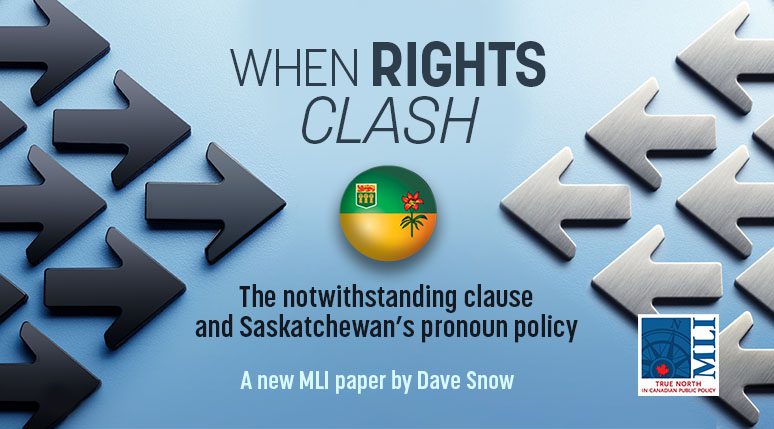OTTAWA, ON (October 10, 2023): After decades of dormancy, Canada’s notwithstanding clause (NWC) was invoked in seven bills across four provinces between 2017 and 2022. More recently, Saskatchewan Premier Scott Moe announced he will introduce legislation invoking the NWC to require parental consent when schools authorize name and gender pronoun changes for students under the age of 16.
In this new paper, When rights clash: The notwithstanding clause and Saskatchewan’s pronoun policy, Dave Snow argues that the conflict over parental consent and children’s pronouns is the type of issue for which the NWC was envisioned: disagreement with a judicial decision, in an area of provincial jurisdiction, over a “clash of rights” not directly enumerated in the text of the Charter.
“I do not take a position on the merits of Saskatchewan’s policy,” writes Snow, “though I do take the position that both proponents and opponents of the policy are approaching the issue in good faith.”
According to Snow, far from undermining the Charter, the NWC is a crucial part of it: existing to allow for parliamentary engagement and disagreement with judicial interpretations of rights. The NWC ultimately acts as a counterweight to the centralizing tendencies of the Charter.
“It is not surprising that the NWC is being deployed for a law addressing the contentious issue of gender identity in schools,” notes Snow. “The core dispute… implicates foundational questions of parenthood, identity, privacy, and consent. But above all, the matter implicates rights.”
Snow notes that as democratically elected representatives are often constrained in making policy on issues over which there is a wide range of reasonable disagreement, the NWC acts to empower legislatures to take a side in reasonable disagreements. It is likely to promote and extend debate, rather than prevent it, ensuring that a law will be subject to the cut-and-thrust of parliamentary discussion and to scrutiny from the public. Furthermore, the clause’s five-year expiry ensures that governments that invoke it must face voters before doing so again.
“In our judicialized political culture, it is rare to see governments get involved in political disputes involving such an obvious clash of rights,” writes Snow.
“Recently, other provincial governments have bucked this trend, indicating a willingness to disagree with, the judiciary and to offer their own interpretations… Regardless of the final policy outcome, one thing is certain: the NWC will not be the final word on the issue – just as its framers intended.”
To learn more, read the full paper here:
***
Dave Snow is an Associate Professor in the Department of Political Science at the University of Guelph, where he was the graduate coordinator of the Criminology and Criminal Justice Policy program from 2018-2020. His research and teaching interests include public policy, criminal justice, constitutional law, and federalism.
For further information, media are invited to contact:
Skander Belouizdad
Communications Officer
613-482-8327 x111
skander.belouizdad@macdonaldlaurier.ca







